S. Scott Whitaker's Blog, page 16
May 3, 2014
Today's 30/30 poem inspired by Revolutionary War Spy Correspondence
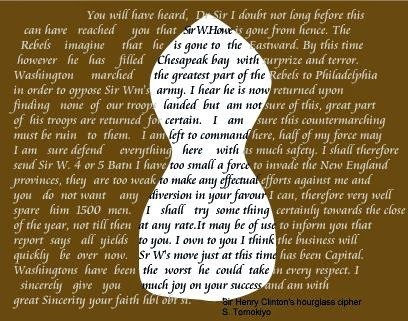
I've long been interested in espionage and poetry. The French Resistance used poetry to throw off the Nazis in World War II, a subject I've explored before, in "Dinner Night At Henri's." (My good friend Nate McFadden recorded the poem for his blog and podcast--click the link to enjoy)
Today's poem is inspired by masks used by Revolutionary spies, which I have recently re-discovered by watching TV. AMC's Turn has a bunch of cool spy techniques detailed on its paper-cut intro, and uses one of the mask techniques in a recent episode. The mask pictured here works best with handwritten work, so the poem I've worked on today is more of a code.
The poem is also inspired by harmonics, as was yesterday's poem. AP Psychology students had an ear full of me last week when we looked at perceptual illusions, including harmonic illusions and psycho-audio hallucinations. Go here for a link about Diana Deutsch's audio illusions. So some of the poem is about saying words in the right key or tone, to open that magical door. The words Abracadabra are meaningless, and it is not the words but the sounds the syllables make that make the magic happen, as with poetry.
Here's a sampling of today's poem:
Oh, my middle sleep! The grease our skins make under the sheets,nightsweat in the beamed dark, fire lit shades drawn closed,the theatre a candle makes of dark places, anything ordinarytransforms. Every other word is truth, to cipher the wealtake a pen and scratch out the eyes. To shade, to shadewhat have we been voted into or out of? My ghastly toe-headed conspirator, the pale is the knife wiped clean.Vibrate with me as we speak the vowels which are gauges,valves for your sweet breath, your sweat breath and mine.Laws unmasked as they are made. Unmake men and take them to edge a field, to meet a faceless man and share a bag of coins.
You can read the whole thing here when it is posted later today.
Published on May 03, 2014 14:05
May 2, 2014
The Nigerian Kidnappings Inspire today's 30/30 poem
On the way to school, NPR ran a story on the Nigerian kidnapping of 230 schoolgirls. It struck me as a parent and a writer about the story. Throughout the day it simmered. On my lunch break I looked up some Yoruba words, and after school drafted the poem.
The initial draft was a two pronged poem: a satire of Hollywood writers pitching a film about a father who goes after the kidnappers, and a poem about the sound of the grieving parents. I meant to show a harsh division of worlds and privilege, but one that shared a similar tonal sound--as in machinery, background noise, harmonics, etc.
WESTERN/AFRICAN HARMONICS
The tubes of this poem vibrate at 1093 hertz, the stir of womb memory.
Scene: Lattes, milk galaxies. Three smart execs type out the pitch:a gaunt dark father hunts for his daughtera pretty mother, wasting with tears, gathers a protest.“For Cannes.” They nod and screen down. “We can shoot in South Africa. Cheap, plus local color”“How does it end?” One asks, palm trees reflecting upin his glare greened glasses. The others shrug.“How about he finds them, kills the kidnappers, but dies in the escape?” Silence. Latte galaxiesunarm as they sip and type and tweet and like.The office hums, vibrates with the pitch of Traneair conditioners, fat black power lines.
Cut scene: Chibok, Nigeria is five plane hops away, plus a un-shocked truck ride, and an hour of walking. The long Nigerian wood is bare and truthful as a skull, or as untruthful as a weather vane in an Atlantic wind.Enter two wrung hearts as empty as shirts drying on a line.A pair of parents gather with other losses carrying signs, Each is a wooden bowl, empty, and chipped and salt dried and stained. A collective murmur risesto roar and back to murmur again as the throat aches and dries.But the final draft, which you can read here---once it's up--focuses on the sounds of grief. Any exploitation I satirized was removed, but the fact that I used the event for my own work is not lost on me, though I hope the draft is not exploitative. It is not my intention. I felt that it cheapened the grief, in some way, or my clumsy expression of it. Anyway, that is my contribution for the day.
The initial draft was a two pronged poem: a satire of Hollywood writers pitching a film about a father who goes after the kidnappers, and a poem about the sound of the grieving parents. I meant to show a harsh division of worlds and privilege, but one that shared a similar tonal sound--as in machinery, background noise, harmonics, etc.
WESTERN/AFRICAN HARMONICS
The tubes of this poem vibrate at 1093 hertz, the stir of womb memory.
Scene: Lattes, milk galaxies. Three smart execs type out the pitch:a gaunt dark father hunts for his daughtera pretty mother, wasting with tears, gathers a protest.“For Cannes.” They nod and screen down. “We can shoot in South Africa. Cheap, plus local color”“How does it end?” One asks, palm trees reflecting upin his glare greened glasses. The others shrug.“How about he finds them, kills the kidnappers, but dies in the escape?” Silence. Latte galaxiesunarm as they sip and type and tweet and like.The office hums, vibrates with the pitch of Traneair conditioners, fat black power lines.
Cut scene: Chibok, Nigeria is five plane hops away, plus a un-shocked truck ride, and an hour of walking. The long Nigerian wood is bare and truthful as a skull, or as untruthful as a weather vane in an Atlantic wind.Enter two wrung hearts as empty as shirts drying on a line.A pair of parents gather with other losses carrying signs, Each is a wooden bowl, empty, and chipped and salt dried and stained. A collective murmur risesto roar and back to murmur again as the throat aches and dries.But the final draft, which you can read here---once it's up--focuses on the sounds of grief. Any exploitation I satirized was removed, but the fact that I used the event for my own work is not lost on me, though I hope the draft is not exploitative. It is not my intention. I felt that it cheapened the grief, in some way, or my clumsy expression of it. Anyway, that is my contribution for the day.
Published on May 02, 2014 17:27
May 1, 2014
Common Core Standards and Urban Decay Inspire First Poem for 30/30 May
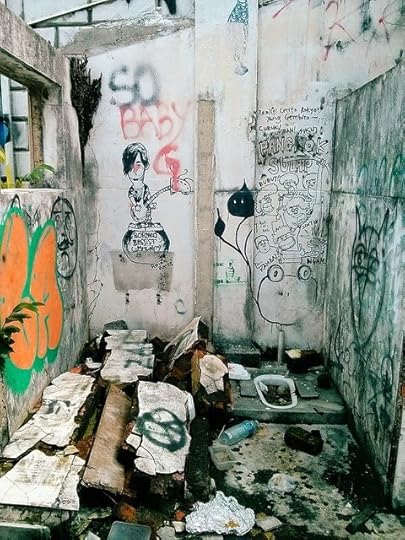
This May I will be giving my time to write 30 new poems for Tupelo Press, which is in the throes of raising money via crowd-sourcing for new projects. They are non profit. Grants remain at recession lows.
So, this morning as I met with my graduating seniors during their one on one conference (we discuss plans for success, grades, papers, attendance, etc) I pulled up Common Core Apps while waiting for a senior to fetch his book for his book report. The app is Common Curriculum, a cool lesson plan and web posting service. For some reason the idea struck to adopt some of the standards for a United States of Poetry--which sounded dystopian and Orwellian to my ears. So I mashed up some made up standards with some urban decay riffs. The urban decay riffs will need tweaking as they don't really strike any new visual ground, but rather cull standard tropes together. The made-up Common Core riffs are meta, and will also need to be made consistent. There is obvious commentary about CC evident in the adoption of them as a trope, but personally I don't feel one way or another about CC. It's solid. It's red tape mumbo jumbo. Some politician's pet publishing project will make millions from the lobbying CC has generated/will generate.
Hey--I only have a few hours after school to make this stuff up. There is little league soccer, homework with my kids, homework to grade, and chores to be done--after co-teaching with a student intern all day.
Here's a sample. You can enjoy the whole thing here--when it's posted. You can donate as well, please just mention my name at the CC or paypal line.
CITY DYSTOPIA POEM WRITTEN IN COMMON CORE STANDARDS
Published on May 01, 2014 16:05
April 26, 2014
I am returning to Tupelo Press for the 30/30 project to raise money for the poetry small press
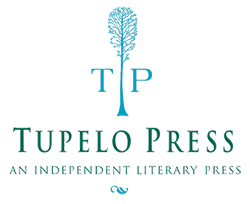
In May I will be composing a new poem a day to raise money for Tupelo Press.
I do not have a book published with Tupelo Press, heck I don't think I've ever even reviewed a Tupelo Press book in my time as book reviewer at The Broadkill Review. Still, it's cool that I was asked back to write for their very interesting fund raiser.
What Tupelo Press does: Small presses are everywhere, and chances are they are struggling to make ends meet. Arts grants and funding has shrunk in the recession, and are just beginning to return to many states, and small presses are trying to figure out ways to bring quality work to the table. E-books, conferences, social media, and even Kickstarter have proven to be ways for small presses to continue producing in the shadow of the large, commercial publishing houses.
Tupelo Press puts out some kick ass books. They're funding a Neruda work, and printing quality chapbooks.
During the month of May I will be writing a new poem everyday and you will be able to follow my progress at the 30/30 page, and here on Field Recordings, when I have time to discuss the work in the wheelhouse. As I write daily I will be asking for donations, through paypal, to help fund Tupelo Press Projects. Even a dollar would help, and as Tupelo Press is non-profit, non commercial small press, your contributions are tax deductible.
Why bother? Because Tupelo Press values the voices of the outsider, the voices of marginalized, the voices that get lost at large commercial publishing houses looking to make a quick buck.
My writing will be available for commission as well, I can pen you something just for you, dedicated to you, and/or to those you love. With Mother's Day around the corner, why not a personalized poem?
Please consider giving a dollar, or two . Or even buy a cool book of poems for your library or for a friend. Just mention my name in the notation when you pay out.
Here are the ways you can donate to the 30/30 project:
For the Poetry Lover--$99
1. Subscribe to Tupelo Press!
Visit: http://www.tupelopress.org/books_subscribe.php
Purchase their dynamic 2013 series – 9 books for $99 and they’ll pay the postage!
Or choose one of Tupelo Press' exciting prior series, or a personalized list of any 9 titles.
Put your poet’s name (that would be me) in the “Is this subscription in honor of a 30/30 poet? If so, please list their name here:” field.
The most affordable option --via CC--you can donate a dollar or more2. Complete the Tupelo Press Donation Form
Visit: https://www.tupelopress.org/donate.php
Scroll down to the bottom of the page, fill out the donation form
and send it in with a check or fill in the credit card details.
Put your poet’s name under the
“Is this donation in honor of a 30/30 poet? If so, please list their name here:” field.
The Most Affordable Option--Paypal version--you can donate a dollar or more
3. Donate Using PayPal
Visit: https://www.tupelopress.org/donate.php
Click on the orange “Quick Donation via PayPal” button and complete the entry
with either PayPal account details or credit card information.
Put your poet’s name in the “Dedicate my donation, in honor of: field.
Include a mailing address if you would like a tax receipt.
I hope you will help participate and commission a work, or simply donate a dollar or two.
Published on April 26, 2014 06:00
February 23, 2014
Writing on the Train. Romance of the Rails. Amtrak to Offer Writer's Residencies

Old workshop and grad school buddy, poet, author, father, ale drinker, and quip master--Eric McHenry posted on this Facebook this week: Inside Amtrak's (Absolutely Awesome Plan to Give Free Rides to Authors) but I didn't get around to until Sunday, when March, my wife and compatriot, nudged me into actually reading it.
It's a smashing idea, of course, and the old brain started to scheme and plot, plan a way to get a ride, test run another leg of the old Amtrak grant! Of course, all to help Amtrak work out the kinks of course! Where would I go? What could I write!?!
Trains and American culture have long been involved. A pair of old lovers who meet after a long spell and enjoy hasty drinks and long greasy sleeps.
George Gershwin wrote Rhapsody in Blue after taking a train to Boston--hearing its rhythms and music influenced the syncopated rhythm that he believed defined American music.
One of the most exciting passages in American poetry is about trains, and is smack in the middle of Hart Crane's The Bridge. The poem "The River" opens with the harker's line "Stick your patent name on a signboard /brother--all over--going west--young man...the telegraphic night coming on Thomas//a Ediford--and whistling down the tracks." Crane's poem travels the rails, the river, playing the hobo vagabond music that touched his outsider soul and allowed him to effectively fuse America together, by breath and diction, what only the river or the rails had done before.
And of course Crane was just having a conversation with Walt Whitman about trains, and America. Whitman's own verse fusing together disparate parts of the land, "I see trains of cars swiftly speeding along railroad tracks, drawn by locomotives, I see the stores, depots, drawn of Boston, Baltimore, Charleston, New Orleans.."
Music of the rails, the harmonics of gliding on steel.
William Carlos Williams took short train rides into the city frequently, and in the autobiographical (trans)script, I Wanted to write a Poem, Williams briefly touches upon his love of the stage. The lights of Broadway were a short train commute from Rutherford, NJ, and the whole of the experience, the travel, the anticipation, the stage, certainly inspired Williams throughout his career.
With Jason Wheeler, the motorcycle madman of Emrerson, Maastricht, Boston, and environs, I traveled Europe by train and wrote tons of scribble notes, journal details, and pseudo-beat poems on trains.
I saw New York for the first time by Amtrak. It's sprawling juggernaut beginning where the graffiti shoulders the concrete overpass tunnels. The smells of hot air, hot steel, industrial strength cleanser a moth ball to my green lungs.
Trains are great. Heck, where I live grew fat on trains, the tourist spillways used to open from Philly, New York, and Boston, and the Eastern Shore of Virginia would fill up with sportsmen, and wildlife enthusiasts who would travel down to enjoy nature's treasures. Unfortunately, those trains do not run anymore.
If Amtrak were to gift me a residency, I'd hoof it to Wilmington and take a northern route, New York, or Boston, writing and watching, writing and watching. What a great way to experience the country inside and outside yourself.
Published on February 23, 2014 07:46
January 17, 2014
Jeremiah Walton, a poet on the road and at work, one of Gatsby's Abandoned Children
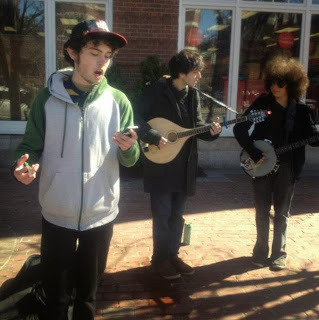
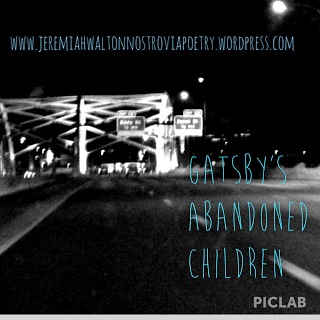
Field Reoordings welcomes Jeremiah Walton to the internet wilds. Walton (above--performing on the Beantown streets) is hard at work, promoting poetry, poets, and working on his own craft. Links to his blog, his projects, his free work, and his video performances are included throughout.
Name: Jeremiah Walton
Pen Name: Jeremiah Walton
Most recent title published:Smile W/ Sparks (of a shotgun shot) from W.I.S.H. Publishing
Where do you write?
I write pretty much anywhere. Most of my poems stem from conversation with others, or conversations others are having. I do a lot of people watching.
I also like writing under bridges, and on other public property walls.
I post poems and travelogues to Gatsby’s Abandoned Children.
What are your rituals with regards to writing (ex: Must have tea, a cat on the lap, etc)
I don’t have a particular ritual besides obsession. I’m almost constantly working on a publishing project, writing, organizing manuscripts, and all that wonderful jazz that comes with poetry.
Tell us about your new book. What themes are you exploring?
Smile W/ Sparks (of a shotgun shot) focuses on my experiences with friends, getting drunk on the tracks, chasing trains, going to shows, and all the weird adventures we would go on.
It’s a testimony to my home, I realized recently, as my friends have all started moving off with their lives, and diverging from where we grew up.
It can be read free online from the publisher.
What were some of the challenges gathering the collection?
I’m haphazard with my collections. I usually look over my writing from the past couple months, decided what fits together and what doesn’t, begin organizing it into a (relatively) themed book, and go from there.
Describe your writing process:
It happens. I don’t have any control over when an idea hits me. I have something to record ideas on me at all times. Rarely do I sit down and force myself to write anymore. I look for poetry in everything around me.
What do you do when you begin to revise? What's the first thing you do during that process?
I read it out loud to myself, and make edits as I go where I don’t feel it flows well, or conveys what I’m trying to say. My favorite thing to do when revising poems is take a rough draft to a slam or open mic. It makes me more conscious of what I’m saying when I have an audience. I usually get off stage, and immediately begin re-writing.
When revising, how many drafts do you go through before you feel comfortable with the final product?
I have no idea. None of my poems are ever done. I just tweak and edit when I feel it’s appropriate.
When arranging lines for your poems, what do you consider at the micro level-- about the line? (For example...I never end a line on the word “and” etc.)
I don’t know, I usually just write as it comes to me, transitioning from line to line. I guess it would be punctuation. I use periods and commas in most of my poems to pace it.
As a poet, whose music, or voice, sometimes do you hear as you write or revise?
I don’t particular hear any voices when re-vising. I do find myself writing homage to Lawrence Ferlinghetti and Allen Ginsberg sometimes though. I really dig their work, especially Lawrence’s. I love how he went beyond just writing poetry, and was an activist for creativity.
How would you classify your poetry? Are you a lyric poet? A Romantic? A Surrealist?
I write for Gatsby’s Abandoned Children (which means something, I believe). Other than that, I use imagery like I’m addicted and humping paper in great spurts of orgasmic foaming-of-the-mouth poems that provoke me into writing more poems.
What poets are you currently reading? What is the state of American poetry, in your opinion?
The poetic community is a Chinese finger trap with two middle fingers trying to break boundaries, and failing miserably. The middle fingers are slam and academic.
Steven Roggenbuck is succeeding where thousands are failing. He’s innovating poetry for the 21st century, writing for this time.
I’ve found myself reading less and less due to my time being devoured and digested by the projects I have going on. I’ve bitten off more than I can fit in my mouth, but I’ll cram it in there one way or another.
For the most part, I read submission to UndergroundBooks, W.I.S.H. Publishing, The Traveling Poet, and Nostrovia! Poetry, which has put me in contact with some damn amazing writers.
What poets/poems do you strongly recommend a reader to discover?
Steven Roggenbuck, Felino A. Soriano, James Browning Kepple, James Chang, Matthew Moseman, The Plastic Clown, Kim Göransson, and a good chunk of the Beats.
The contemporary American poetic tradition is elegy, do you discover elegiac qualities among your own writing as a whole? Are you a poet of loss?
I’m a poet of people, and sometimes people are saddening.
Where does your inspiration come from (music, film, other books)?
People watching and creeping along sidewalks of city streets, listening to the conversations of others, observing the lethargy and rush, conversations in movies, the prose and poetry of the Beats, drugs, the internet, strange occurrences, Reddit, love, my frustrating love for humans.
It all comes to people peopling, and I want to trap the voice of humanity on the page.
I keep a quote book of odd and humorous things my friends and people I know say. I record the quote in a notebook, titled Context Not Included. I’ve dug up some great ideas from re-reading the quotes from the past year.
Explain how your local and regional environment influences your writing, your process, and your product (in other words, how does your reality intersect with the worlds that you create?):
Manchester, N.H., you influenced my poems for 18 years, and the road and traveling followed your trickles of musings, and now Erie, P.A., is kicking me in the balls, and I am kicking right back, aiming for the entire community, hoping to kindle a storm of creative arts that will take to the streets and drag painters and poets and playwrights and all artists out their doors and away from the televisions and time-filling devices that cradle us safe.
You have to invite three authors to dinner, who are they? Why?
Lawrence Ferlinghetti, Allen Ginsberg, Jack Kerouac.
Because we’ll leave dinner to walk around town and talk about living and go live and live a poem, and then write that poem.
Though I fear Jack may be a dick. I’m not sure though.
Favorite title (you wish you had come up with):
Do Androids Dream of Electric Sheep?
Line(s) you wish you wrote:
"The only people for me are the mad ones, the ones who are mad to live, mad to talk, mad to be saved, desirous of everything at the same time, the ones who never yawn or say a commonplace thing, but burn burnburn, like fabulous yellow roman candles exploding like spiders across the stars."
Book you did not read in high school but now have read and have an appreciation for: And why:
Just exited high school. I guess I haven’t experienced this yet.
Favorite words:
“I” (sadly)
Least favorite words:
“Surrender”
Advice you would like to pass on to other writers:
“Write
write
write
do not burn out!”
What you would discuss with your pet if your pet could talk:
“Stop staring at me when I eat.”
“No.”
Published on January 17, 2014 03:00
December 4, 2013
The Black Narrows is featured on poet Linda Lianne's blog this week.
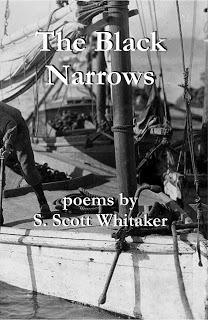
Lenny Lianne is featuring The Black Narrows on her Writer's Digest Award Winning blog Passport to Poetry. You can buy The Black Narrows here, or at the Book Bin, Saturday, December 7th, from 11-1, where I will be camped, and signing, and chatting all things poetry. Come by and say hey.
Published on December 04, 2013 03:00
December 1, 2013
Scott Whitaker among featured poets signing books at Book Bin's Open House, Dec 7th

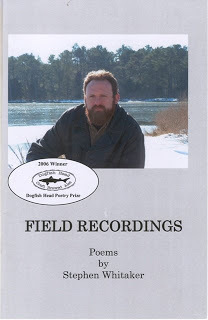
From 11AM - 1 PM on Saturday, December 7 I'll be signing and selling books at the Annual Book Bin Holiday Open House. The Book Bin is located in Onley, VA, in Four Corners Plaza. I'll have The Black Narrows, Field Recordings, and some handmade chapbooks for sale. Stop by and say "hello.
Book Bin
Four Corner Plaza
Onley VA 23418
757-787-7866
www.bookbinva.com
Published on December 01, 2013 14:35
Dogfish Head Poetry Prize Celebration, Rehoboth, DE Sat 12/8 features Tina Raye Dayton, Gerry LaFemina, great poetry

The presentation of the Dogfish Head Poetry Prize takes place Sunday, Dec. 8, from 5:30-7:30 PM, at Dogfish Head Brewings and Eats, 320 Rehoboth Avenue, Rehoboth Beach, DE. There will be poetry readings by last year's winner, Tina Raye Dayton, and by the director of the Creative Writing Center at Frostburg State University, Gerry LaFemina, followed by a reading and book signing by this year's winner. Light fare will be provided. Let's stuff the place with poets and poetry lovers!--from Linda Blaskey
Published on December 01, 2013 14:25
October 6, 2013
Soumya Vilekar is seeking the Suroor of the Soul
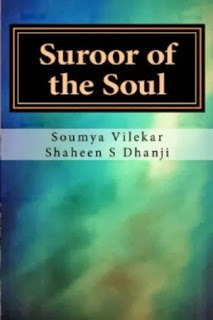
Late summer still burns in the Eastern corridor of the United States. And a tropical storm or two. This weekend we welcome Indian author and blogger, Soumya Vilekar to the internet wilds.
Name: Soumya Vilekar
Pen Name: SoumyaV
Most recent title published: “Suroor of the Soul”
Where do you write? On my blogs at Wordpress and Blogger
You can also find me on my facebook page called “ Poems of Life”.
I am also on Destiny poets , UK poetry Library, Writeforpassion and several other sites as a guest author!
What kind of poetic tradition do you see yourself coming from? (lyric, surrealism, realism, etc) Surrealism with tint of Divinity and spiritualism.
The contemporary American "form" is elegy. How do you see your work fitting into that "tradition"? I am a person of hope and faith. The ray of hope gleams in my poems and I am far away from the elegy!
What are your rituals with regards to writing (ex: Must have tea, a cat on the lap, etc)
Of Course a pen and paper, if not my desktop! Rest ,the lines just flow with the thoughtful emotions.
What themes did you explore in this new collection? What was challenging about culling poems together? The book “ Suroor of the Soul” is a phenomenon in itself. A process which involved my deepest of thoughts and took the shape of verses, inspired by the Divine . The inspiration though in human form came in art of a mystical painting, done by my co author Shaheen!
It was a huge task in the beginning to think and compile, as the poems that I had selected for the book, reflected different phases and moods of life. Gradually the picture became clear and I could visualize the path of a soul who traverses on his journey to seek the ultimate happiness and this became the main theme of the whole book.
What's your personal favorite from the collection? Why? A very difficult question, indeed! To choose a favorite amongst all is a huge task, but still the one closer to my heart is “Divine drops”. Divine drops is a poem which expresses the importance of the presence of the spiritual awakening in a soul. It says, “without the shower of Divine grace, the soul is just a barren land .”
The ultimate bliss of having the Divinity within, can be felt through this poem which yearns to get drenched in the drops of Divine blessings. The poem instills the seed of faith within the unsowed land of our heart .
What do you when you begin to revise? What's the first thing you do during that process?
My poems are usually spontaneous and that is the way I post them on my sites, as the rawness and the natural tone of the thought brings out the real freshness while reading the verse and the reader can feel the same while going through it.
But when I have to submit it for any anthology or for any other site, I try to edit the unnecessary lines first, those which break the flow and the imagination.
When revising, how many drafts do you go through before you feel comfortable with the final product? In general, if a revised draft is needed, as in the case of a book, I may edit it once or even upto 5 times until I get the true feel of the verse. The final product should touch my heart instantly and should not give neither any false or wrong statement or information nor convey any such idea or thought. What I approve and like, is the ingenuity and the truth of the thought expressed!
What poets are you "borrowing" from, or riffing from these days? Do you hear these "voices" as you revise or write? I have read quite a few poets and authors, but frankly speaking, I do not like to borrow nor copy from any of the authors, even though they are great legends. Their work impresses me and I adore their way of style and writing, but being myself is my nature and I love having a distinct personality in work or in real.
Where does your inspiration come from (music, film, other books)? Any kind of soothing music, a touching and a sensitive film, a powerful and thoughtful line from any book ,anything can inspire me to write. But its the nature that gives me the sense very clearly and beautifully. The eternal nature always remains my favourite inspiration.
Explain how your local and regional environment influences your writing, your process, and your product (in other words, how does your reality intersect with the worlds that you create?): “Inspiration, I feel is a zest which gets birthed within when we come across the real truth of life, not living.”
When we talk of living, the fight for survival and the extreme ends of other social stigmas get attached to it! The portrayal of truth of today’s world has a very sensitive and ugly face, which can bog down minds, instigate conflicts within and outside. It is a world of chaos, where everyone is running without any proper destination.
The word Humanity has been almost wiped out and the realization of being human is dying forever every minute.
It is not the awareness of this social condition which is needed in the society, as people are already aware of the happenings around the world.
It is the awareness of one’s soul, one’s conscience which is needed to be able to create difference in this world through efforts of changing self.
The attitude, behavior, the perspective of every person now needs the insight and depth.
Being an optimistic person and an equally spiritual one, I like to look towards the light which shines on everyone without any discrimination and hence I write on lines which motivate, inspire and add a sense of enthusiasm to life, rather than presenting a true sad picture of the society.
Life has something different to offer at every instance. The universal creation of nature around us is in which we bask every moment has millions of beautiful inspirations to offer.It has the beauty of a child which touches the heart by an innocent smile. The blooming swaying flower, a beautiful bird soaring in the sky, a candle burning with elegance, or a wave touching the bare feet… the drizzle which wets our mind and heart, the music which makes us cry and dance, the tender touch of a lover, or the helplessness of being away from him forever.
Anything that touches the core of my heart inspires me to write.
What's your literary guilty pleasure (sci-fi, 50 Shades, westerns, etc)? Spiritual and Philosophical
You have to invite three authors to dinner, who are they? Why? Rabindranath Tagore, Paulo Coelho,William Wordsworth.
The imagination and the devotion of Rabindranath Tagore can be seen in his works, which ranged from stories and novels of social condition of that time with a tinge of modern thoughts assimilate din the characters.
His poems and stories always lead a sense of importance of freedom, whether of people or of thoughts. And finally when his imagery touched the sky,it created a wonderful rainbow of verses. The flow, the language and the deep sense of insightfulness revealed in his novels.
Paulo Coelho is yet another favorite of mine, neither because he writes about anything related to spiritualism or spiritual practices of other genre nor because of his philosophical based events that are included in his novels.
But because I find his work to be of genuine character, those which he has seen or experienced in life.
The ever learning process is reflected in his works, when we read his books we find they vary in depth and intensity, providing us a deep insight into human nature. A person who transforms himself while on the path of his journey, experiences and cherishes several moments and learns from such rare encounters, a learner of a kind, his works show evolution of the human soul and mind.
Favorite title (you wish you had come up with): The endless world of dreams and the ceaseless imaginations shall provide me with a title which I would love to come up with..For now It’s the “Suroor of the Soul” . Literally speaking, this is the title of the painting of Shaheen, my co author in this book and this is one title which has touch the heart!
Line you wish you wrote: I respect ingenuity and hence will surely create a line of myself!
Book you did not read in high school but now have read and have an appreciation for: And why: During my school days, I almost read all the classic literature of those times ,which included works of Charles Dickens, Jane Austen, Alexandar Dumas, Leo Tolstoy. Every phase of my life surfaced a different façade to my nature and hence a new author and a new genre of books got in then as favourites.
Favorite words: Divine, invisible bond, love, eternal, path.
Least favorite words: asylum,cruel,hypocrisy,hate,jealousy
Advice you would like to pass on to other writers: Fiction sells, to follow the ongoing trends is fine, but the most essential thing is to present the truth with subtleness and humility.
Beatles or the Stones? Elvis or Cash? Neither
What you would discuss with your pet if your pet could talk: While I was young, I had a cat ,infact she was kitten when she first came to our house.
The most sensible and beautiful cat , I had ever seen,white in colour,with a black spot on her forehead. The time I have spent with her during my childhood, made me a very different kind of person.
If she had been here today alive with me, I would have told her, “See, this is what I learnt from you. To be patient in life, to be protective for your children, to live life in a happy and cheerful way and to surrender totally to our eternal protector, Thee, without fearing about anything, like you laid your head on my feet to be caressed, irrespective and oblivious of any fear.“
Published on October 06, 2013 03:00



